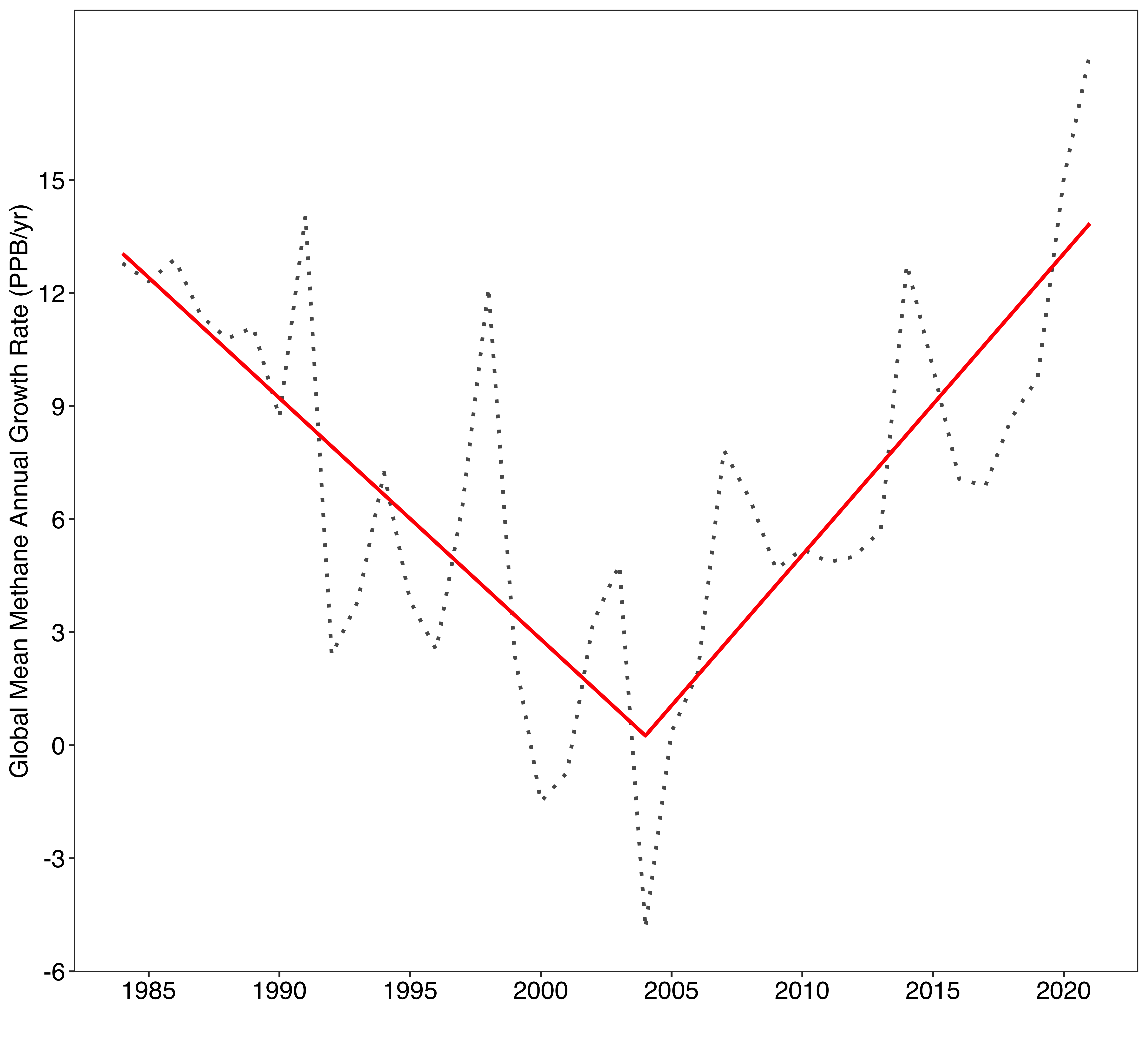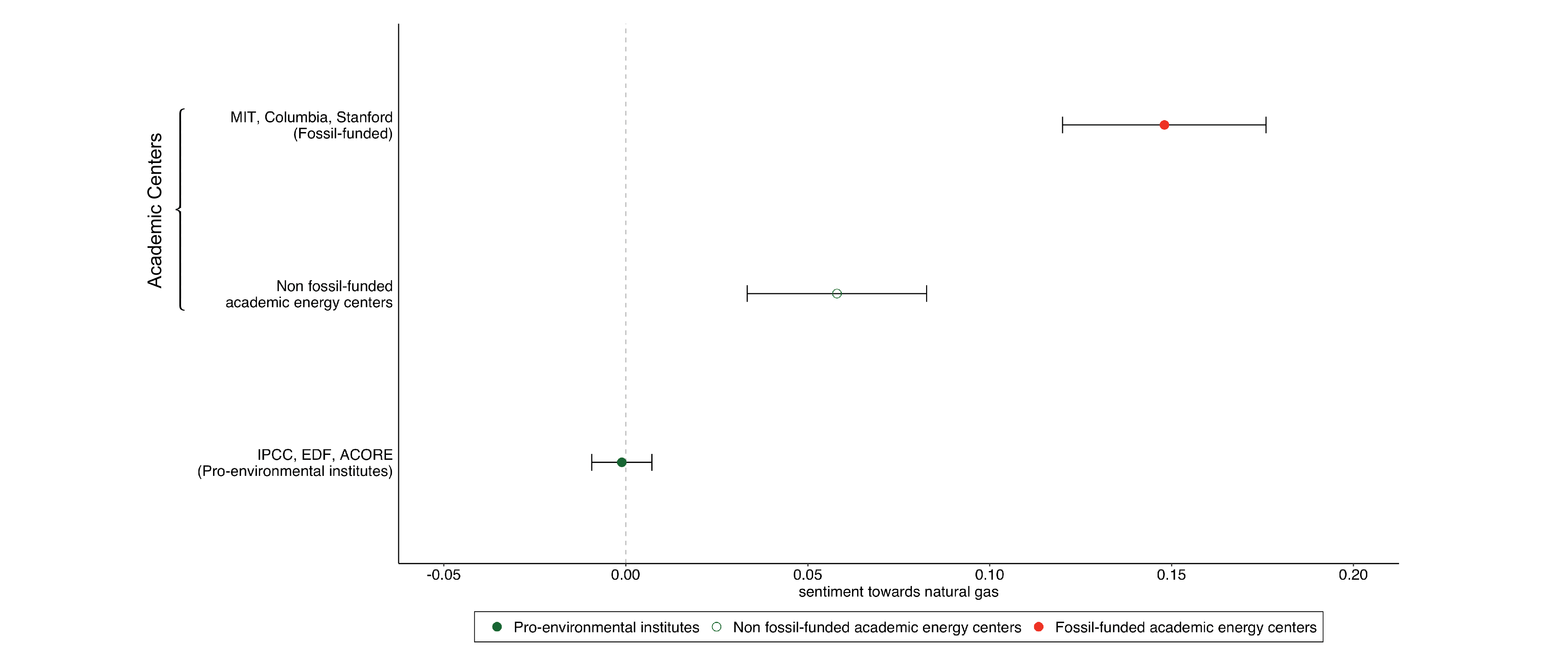Favorability towards natural gas relates to funding source of university energy centers
Published in Sustainability
Concerns about the objectivity of corporate-funded research are long-standing. Science’s 2001 editorial on university-corporate biomedical collaborations observed: “In general, companies pay for research that benefits them and their shareholders….”1 Such worries motivated us to better understand industry-funded research in the context of climate change and the costly transition away from fossil fuels. We set out to study the policy positioning of university-based energy centers on natural gas using a “text as data” approach to center-authored reports. We focused on whether sentiment towards natural gas varied systematically by whether fossil fuel companies were important funders of energy centers.
Why look at methane and natural gas?
Methane is at least 28 times more potent a greenhouse gas than carbon dioxide and is responsible for about 30% of the increase in global temperatures since pre-industrial times.2 A central debate in climate change policy is the appropriate role of natural gas, 75-90% of which is methane. The IPCC recently wrote that “mitigation of methane emissions is very likely to be the most powerful lever in reducing near-term warming”.
All major fossil fuel companies produce natural gas. Since it generates less local pollution when combusted than coal or oil, natural gas was once positioned as a transition fuel and as “likely to be the last fossil fuel to remain standing.”3 But as estimates of methane leakage and venting rates have improved over time, primarily due to advances in satellite observation, natural gas’s climate-friendly credentials have evaporated.4
Alarmingly, global methane levels have risen at an accelerating rate as natural gas production has expanded (see figure below). In the United States, 80% of the methane increase from the early 2000s to 2017 came from fossil-fuel-related methane emissions through fugitive pipeline leaks, venting, etc.5 Indeed, shale gas extraction volumes increased 18-fold from 2004 to 2021 in the United States. At 38%, natural gas is now by far the largest source of energy for electricity generation in the US.

Enter academic energy centers
Academic energy centers are increasingly at the forefront of policy discussions on the energy transition, and reports published by energy centers have been the main subject of US Senate Committee hearings and cited in US House Resolutions. Yet surprisingly, most of the research published by these centers (whitepapers and reports) does not undergo the usual peer-review process of academic journals. We therefore wondered: do longstanding concerns about the objectivity of corporate-funded research apply to academic energy centers as well?
We study 26 energy centers across the US, UK, and Canada. Columbia’s Center for Global Energy Policy, MIT’s Energy Initiative, and Stanford’s Precourt Institute for Energy have received particularly large donations from the oil and gas industry. To categorize centers for their fossil funding dependence, we reviewed the main donors in publicly available data, e.g., center websites and reports. This process highlighted the difficulty of tracing industry donations in this climate-impactful space. Many energy centers we encountered had no information on funders at all, and data on donation size and timing was even more scarce.
Energy center favorability towards natural gas
We apply an objective metric of sentiment common in the growing “text as data” literature to report sentences that mention specific energy sources, including natural gas. We calculate the sentiment scores of 1,168,194 such sentences using the Vader model.
We find that energy centers heavily funded by fossil fuel companies write text that is significantly more positive in mentions of natural gas. We are the first to quantify this favorability, which dwarfs the preference expressed towards renewable energy sources such as wind and hydro power. Indeed, fossil-funded academic centers are just as positive towards natural gas as industry groups like the American Gas Association and the American Gas Foundation, whose explicit mission is to promote natural gas. At academic centers less dependent on fossil donations, solar and hydro power generate a more positive sentiment than gas.
Turning to an analysis of text that mentions specific company names (e.g. “Tellurian”), we find that fossil-funded center reports and tweets are more positive when their funder companies are mentioned.

What are the main policy implications of these findings?
The impartiality of energy center research is difficult for most policymakers or journalists to gauge. Strikingly, only 23% of energy center reports published between January 2009 and December 2020 by MIT, Columbia, and Stanford included explicit funding acknowledgements.
Thus, as has been advocated recently by Craig Callender (UCSD) in The Chronicle of Higher Education, we believe that universities should move more aggressively to disclose information on their funding relationships with the fossil fuel industry. Callender writes:
In essence, the millions of dollars create a kind of shadow academic world, one woven inextricably into the university. It secures favorable white papers, journals, societies, public-policy comments, courtroom testimony, and front groups that attack what the industry sees as damaging science.
No policymaker should be surprised to discover that the fossil industry has funded seemingly-independent research that shaped their decisions, especially when this research is academically-branded. Financial disclosures need to be overhauled to prevent this. Given the fossil industry’s track record of disinformation, universities should disclose exact donation amounts, periods of support, and any funding conditions (e.g. pre-review of reports) whenever the fossil industry underwrites policy-related research, both at energy centers and elsewhere within the university. Because top academic centers write tweets that are more favorable when they mention their funders, social media profile pages (e.g. https://twitter.com/StanfordEnergy) should prominently disclose major fossil donors. Center-sponsored events that include either the press or policymakers should disclose major fossil funders. Turning to individual scholars/researchers/fellows/associates at energy centers, fossil support should be disclosed whenever they give testimony or otherwise seek to influence policy. In a climate crisis, basic financial transparency toward the primary culprit should be a “no brainer” for universities.
Beyond academic greenwashing, policymakers should also be made aware of a more recent fossil industry tactic that appeals to social justice – so-called ``wokewashing.” Poverty reduction, environmental justice, and female empowerment are promoted by Stanford, MIT, and Columbia’s fossil-funded energy centers (respectively). But how earnest are conspicuous appeals to social justice when these energy centers simultaneously and systematically promote the fossil fuels favored by their funders, albeit more subtly? As Lamb et al. have argued, the early industry tactic of outright denial of anthropogenic climate change has since evolved into more subtle (and effective) “discourses of climate delay.”6 Today’s fossil industry promotes non-transformative “solutions” to climate change, re-directs responsibility for greenhouse gas emissions, suggests carbon-saving technological breakthroughs are just around the corner, and “encourages” costly individual actions – like BP’s “know your carbon footprint” campaign – ahead of the more aggressive and systemic solutions endorsed by economists.6,7
Finally, given both pre-existing concerns and our new findings, climate schools – the shiny new thing in academia – have the opportunity to obviate fossil disclosures by decarbonizing from day one. If Stanford’s new Doerr School of Sustainability is indicative, fossil funding is poised to proliferate to climate schools as well.
References
[1] Hall, Z. W. & Scott, C. University-industry partnership. Science 291, 553 (2001).
[2] Global Assessment: Urgent Steps Must Be Taken to Reduce Methane Emissions this Decade (United Nations, May 2021); https://www.unep.org/news-and-stories/ press-release/global-assessment-urgent- steps-must-be-taken-reduce-methane
[3] Tricks, H. The future of oil. The Economist https://www.economist.com/special-report/2016/11/24/the-future-of-oil (24 November 2016).
[4] Zhang, Y. et al. Quantifying methane emissions from the largest oil-producing basin in the United States from space. Science Advances. 6, eaaz5120 (2020).
[5] Jackson, R. B. et al. Increasing anthropogenic methane emissions arise equally from agricultural and fossil fuel sources. Environ. Res. Lett. 15, 071002 (2020).
[6] Lamb, W. F. et al. Discourses of climate delay. Glob. Sustain. 3, e17 (2020).
[7] Howard, P. & Sylvan, D. Expert Consensus on the Economics of Climate Change. New York University Law School (2015).
Follow the Topic
-
Nature Climate Change

A monthly journal dedicated to publishing the most significant and cutting-edge research on the nature, underlying causes or impacts of global climate change and its implications for the economy, policy and the world at large.
What are SDG Topics?
An introduction to Sustainable Development Goals (SDGs) Topics and their role in highlighting sustainable development research.
Continue reading announcement



Please sign in or register for FREE
If you are a registered user on Research Communities by Springer Nature, please sign in